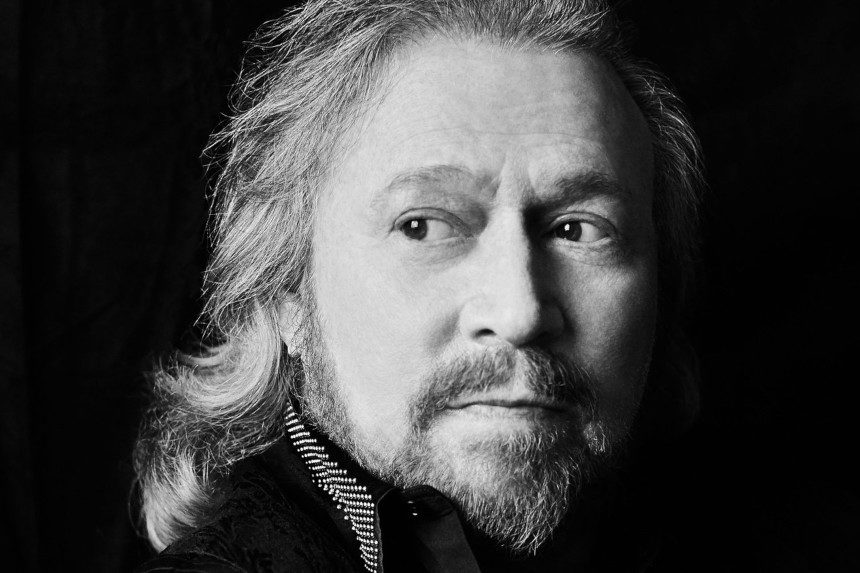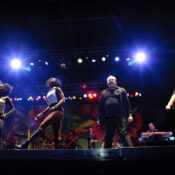Barry Gibb’s latest album, Greenfields (on sale January 8), may seem, at first, to be a departure. The all-star production reinterprets Bee Gees’ greatest hits in a bluegrass vernacular, with appearances by Keith Urban, Dolly Parton, Miranda Lambert, Olivia Newton-John, and others. “I always felt that all of our songs had a streak of country and bluegrass in them,” says Gibb. “Great musicians know how to deal with emotion, light, and color. They know a song is not just something you listen to — it’s something you can see.”
And just out on HBO, there’s The Bee Gees: How Can You Mend a Broken Heart, a documentary film that takes us on a trip through the Gibb brothers’ lives full of colossal ups and downs as millions around the world danced and romanced and sang to their music.
Brothers Maurice and Robin are gone, and Barry is left with his memories of the three kids who started harmonizing when they were children with a dream of fame against all odds. The three went through tough times as their success drove them apart in some headline-making splits. As Barry puts it, “We hoped for all the things that happened to us, but we never expected such success.”
I was in Miami, Florida, where the family lived and recorded. I interviewed them, became their friends, and was lucky to be part of some of their moments of glory. Their songs play in my mind as I remember what it was like to be around three distinct personalities united with the same love of music and their irresistibly offbeat sense of humor.
Barry admits he still struggles with the reality that his brothers aren’t with him anymore. “I talk to them all the time,” he says with a smile. “What would Mo think of this? How would Robin treat this melody? We had problems, but boy did we have some fun!”
At the end of the movie, Barry muses, “I think about how it all sort of started. What did we want to be famous for? It turns out it was the songwriting. That was our most important achievement.”
Jeanne Wolf: Watching you guys at work in the studio, I was always surprised to see that you would write songs on the spot.
Barry Gibb: That’s right. We usually just started with the melody. A few days later we’d all work on the words, play with lyrics, and just start recording. When we created together, it was like we became one mind as we bounced around ideas. Robin came up with this song “Massachusetts.” It went to number one in England, and we just couldn’t believe it. That was really our first giant step on the way to the top. But it turned out to be a rocky road.
JW: As close as you were, there were wildly publicized break-ups. In a way, did being brothers turn out to be the best thing and also the worst thing?
BG: It became all about sibling rivalry and competing, the way a lot of brothers do. With fame and money, our egos kicked in big time. We argued instead of working it out the way we always could. It was all so new that we didn’t know how to behave. Everyone wanted solo recognition, and we were selfish about it. I wanted to sing lead and so did Robin. Maurice had his own plans. We started leading separate lives and did too many drugs. We really didn’t know each other anymore. Maurice tried to be the peacemaker, but more than anything it was just that we needed time to become men, not boys anymore. And sometimes, we became the Bee Gees again.
JW: You had the biggest-selling music album at the time with Saturday Night Fever, which led the way in the disco era. You had so many awards, such enormous popularity — and then disco suddenly fell out of style. Did that teach you something about the pitfalls of international recognition?
BG: I’m so very proud of what we did musically. We discovered what became our sort of trademark falsetto strictly by accident. They asked me to do a scream on one of our numbers, “Nights on Broadway,” and that sound just came out. It sort of became our signature, but then it was time to move on. I got frustrated when we got stuck with the label disco band. But we kept on turning out great music — even working with different artists. I finally began to understand that all the ups and downs added emotions to our creative work. Looking back, I regret that I fell out with my brothers, but we accomplished so much. And I wish we could have kept it together. I miss them every day. But making music still drives me. I’m a singer, a guitarist, a songwriter, a producer, and a collaborator, and I’m most proud that I’m a husband, a father, and a grandfather.
This is an extended version of the interview that appears in the January/February 2021 issue of The Saturday Evening Post. Subscribe to the magazine for more art, inspiring stories, fiction, humor, and features from our archives.
Become a Saturday Evening Post member and enjoy unlimited access. Subscribe now



